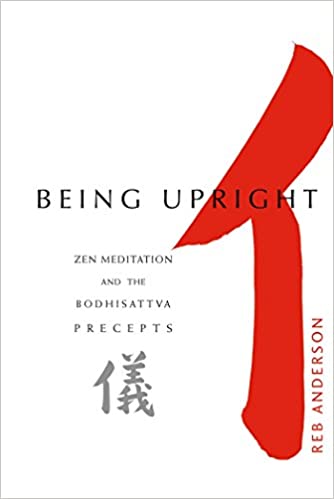The sixteen bodhisattva precepts are a set of vows of ethical conduct taken many times in a Zen practitioner’s life. They derive originally from the vinaya, monastic vows taken on ordination during the Buddha’s time (250 precepts for monks, 348 for nuns). Lay people took only the first five vows. The bodhisattva precepts used in the Mahayana tradition emphasize conduct to benefit others, and are taken by both monastic and lay practitioners. The short set of sixteen precepts we use in our tradition were formulated by Dogen Zenji, the founder of Soto Zen in Japan. They form the basis of several ceremonies: jukai (receiving the precepts), priest ordination, marriage and funeral. Many Zen centers chant the precepts once a month on the full moon, in a ceremony of reflection, repentance and renewal.
The precepts are inexhaustible mindfulness practices. They are also lifetime koans. Norman’s approach to the precepts is warm and down-to-earth, but also spacious and insightful. He helps us to apply the vivid moment-to-moment awareness of our zazen practice in our daily life of work, family and relationships.
See also: Suzuki Roshi Dharma Talks on Precepts, Dharma Talks Blog, compiled by Korin Charlie Pokorny, San Francisco Zen Center.
THE SIXTEEN BODHISATTVA PRECEPTS
Norman Fischer’s version
The Threefold Refuges
I take refuge in Buddha (the principle of enlightenment within).
I take refuge in dharma (the enlightened way of understanding and living).
I take refuge in sangha (the community of beings).
Pure Precepts
I vow to avoid all action that creates suffering
I vow to do all action that creates true happiness.
I vow to act with others always in mind.
Grave Precepts
Not to kill but to nurture life.
Not to steal but to receive what is offered as a gift.
Not to misuse sexuality but to be caring and faithful in intimate relationships.
Not to lie but to be truthful.
Not to intoxicate with substances or doctrines but to promote clarity and awareness.
Not to speak of others’ faults but to speak out of loving-kindness.
Not to praise self at the expense of others but to be modest.
Not to be possessive of anything but to be generous.
Not to harbor anger but to forgive.
Not to do anything to diminish the Triple Treasure but to support and nurture it.
(For additional versions of the precepts, please see 3 Versions of Zen Precepts.)
Study Guide
Please note: we are currently the process of editing and properly categorizing our teachings library. The teachings will become available here in the study guide as soon as they’re ready, please check back soon.
1. Being Upright: Zen Meditation and the Bodhisattva Precepts

By Reb Anderson | 2000 | ISBN 1930485018
“‘Being Upright’…takes us beyond the conventional interpretation of ethical precepts to the ultimate meaning that informs them.”
2. The Mind of Clover: Essays in Zen Buddhist Ethics

By Robert Aitken | 1984 | ISBN 0865471584
Robert Aiken Roshi’s clear, insightful discussion of the complexities of Zen ethics, as they relate to personal and social action.
Purchase the book on Amazon
Purchase the book on Barnes and Noble
Find your local independent bookstore
3. Taking Our Places: The Buddhist Path to Truly Growing Up

By Norman Fischer | 2004 | ISBN 0060587199
4. Waking Up to What You Do | A Zen Practice for Meeting Every Situation with Intelligence and Compassion

By Diane Rizzetto | 2006 | ISBN 1590303423
A down to earth discussion by a Zen teacher who is also a mother and a psychologist.
Purchase the book on Amazon
Purchase the book on Barnes and Noble
Find your local independent bookstore

